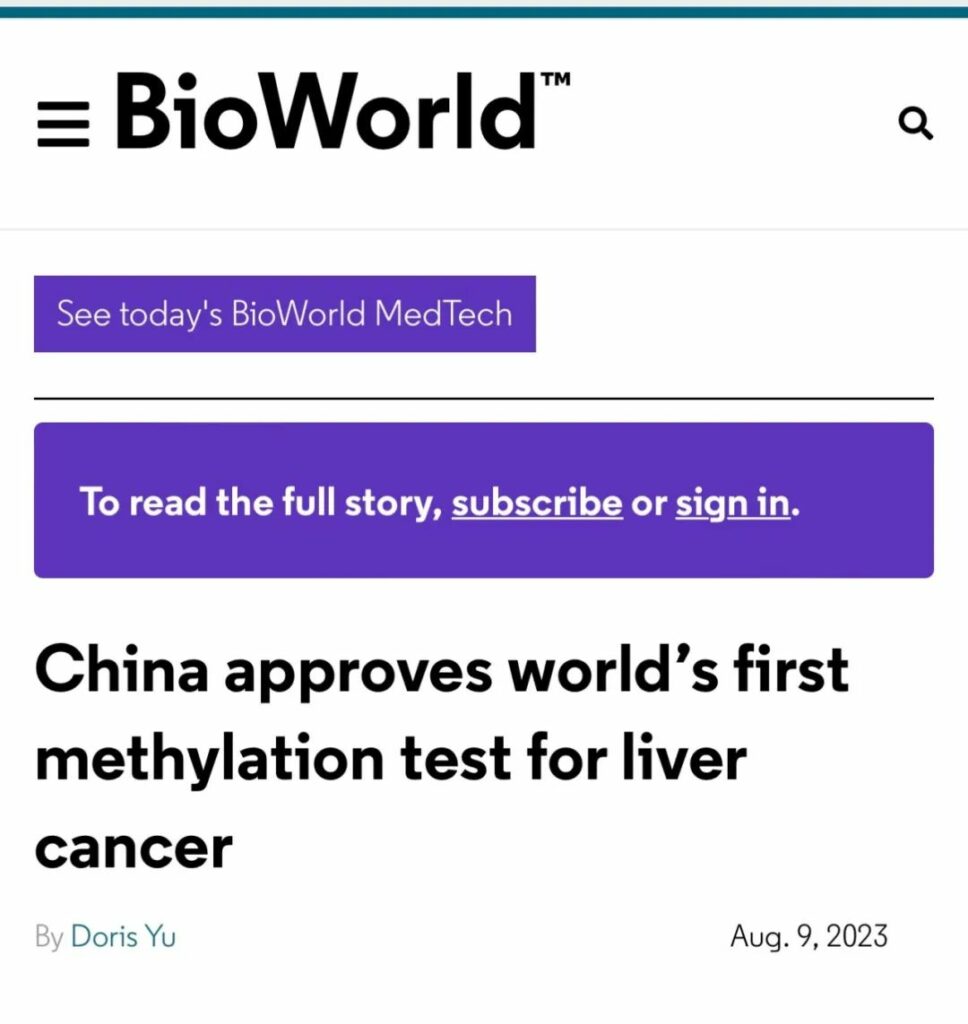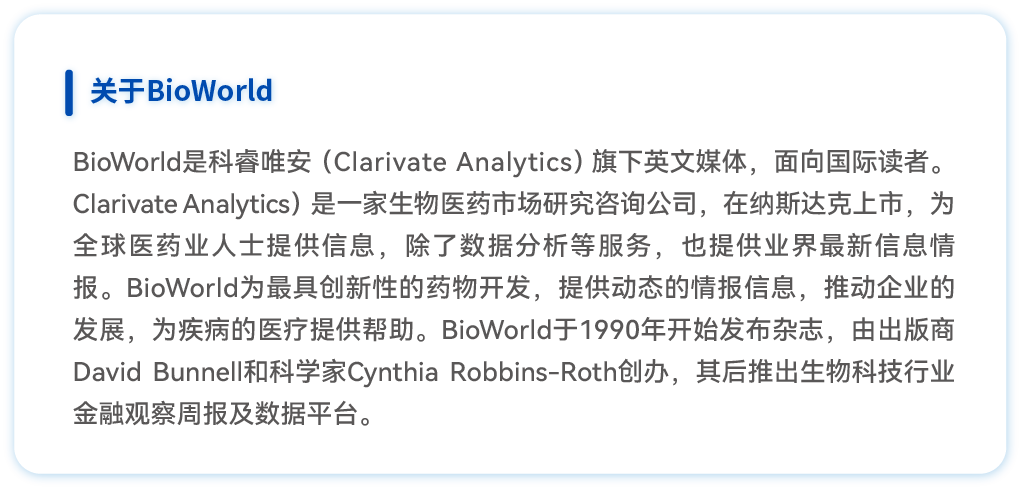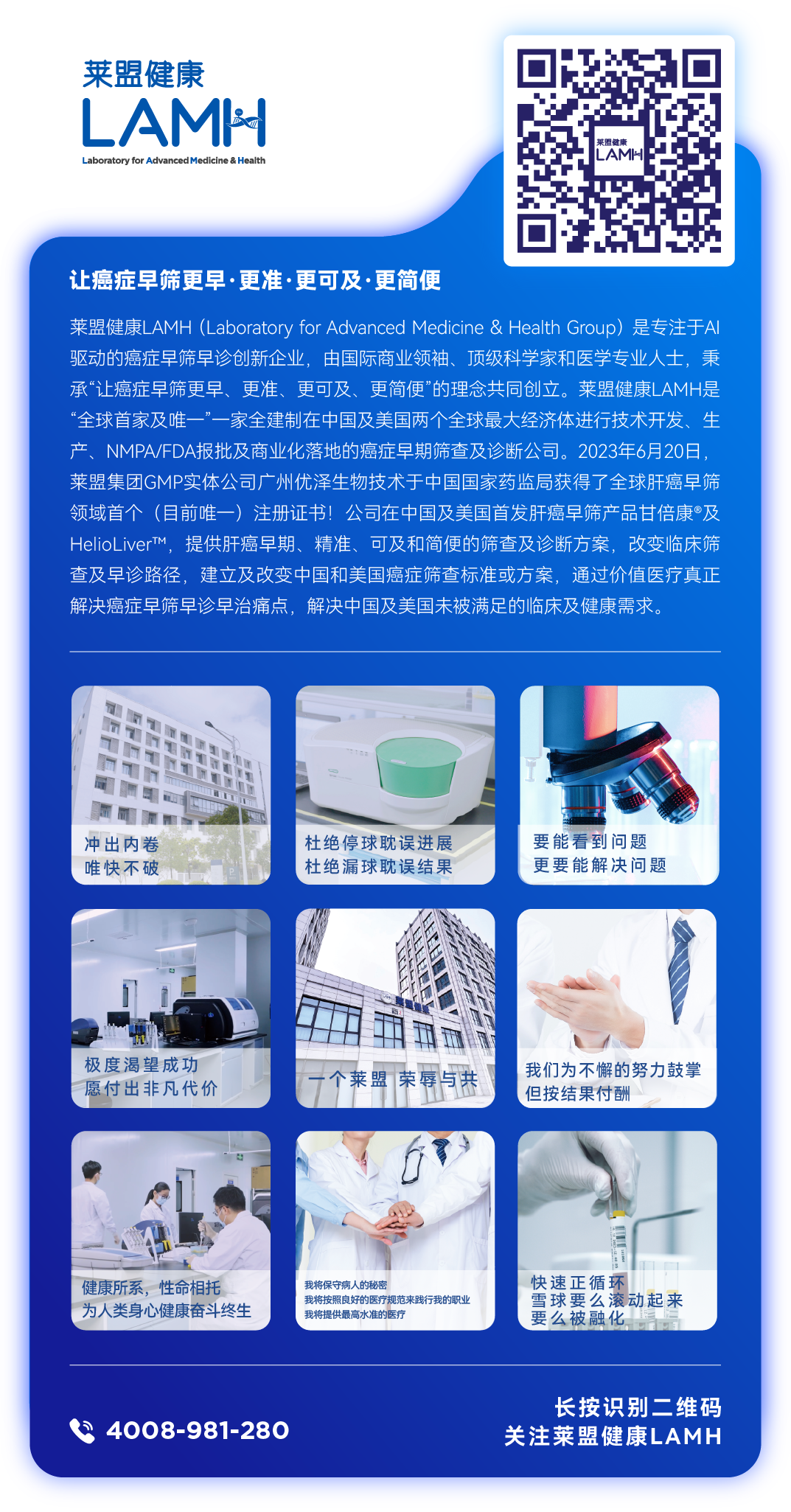
英文专业媒体BioWorld报道莱盟健康LAMH:China approves world’s first methylation test for liver cancer.

BioWorld 网站报道截图
原文如下:Laboratory for Advanced Medicine & Health Group (LAMH)’s subsidiary Guangzhou Youze Biotechnology Co. Ltd. received marketing approval in China for its methylation test, which the company says is the first methylation test kit for liver cancer on the market in the world.
The bone morphogenetic protein receptor type 1A/placenta associated 8 (BMPR1A/PLAC8) gene methylation test,sold under the brand name Ganbeikang,detects trace amounts of circulating tumor DNA in the blood and then analyses the methylation alterations of liver cancer-related specific genes.
Detecting liver cancer and precancerous lesions early is important for effective treatment. Tests kits currently on the market are based on imaging and alpha-fetoprotein(AFP)methods and can only detect liver cancer in more advanced stages.

Zeyue Zhang, chairman and CEO of LAMH
“About 85% of cancer patients are in the middle and late stages when they are diagnosed with liver cancer using existing tests,” Zeyue Zhang, chairman and CEO of LAMH, told BioWorld.
“Based on clinical data, Ganbeikang achieved a sensitivity of 93% and a specificity of 96% in detecting stage I liver cancer,” said Zhang. “The five-year survival rate for liver cancer patients is only 7% when they are first diagnosed in the middle and late stages. However, 93% of liver cancer patients can be diagnosed in stage I (using Ganbeikang) so that the five-year survival rate could reach 87%.
Ganbeikang has higher accuracy and specificity that traditional kits. It can detect nodules and tumours in early stages, reducing the difficulty of surgery and the cost of treatment.
“Besides, the product could also help reduce the cost. When the liver cancer patient is already in the middle and late stages, it would cost hundreds of thousands of yuan that is covered by the national medical insurance to treat the patients. In comparison, when a patient is diagnosed in an early stage using Ganbeikang, it might cost around ¥200,000 (US$27,841) to treat the patient,” said Zhang.
“Since 2010, LAMH has been conducting methylation R&D and clinical trials worldwide by working with domestic and international research institutes to develop cancer biomarkers. To date, we have successfully developed over 3,000 validated biomarkers covering 22 cancer types,” Zhang added.
“In addition, the company has completed clinical enrollment for its early screening product for liver cancer in the U.S. This is what we have been working towards for many years. In the next five to 10 years, we will continue to invest heavily in technology development and achieve the approval and commercialization of more early screening and early detection products for cancer.”
In 2020, there were 410,000 new cases of primary liver cancer patients and 391,000 deaths in China, according to LAMH.
“China accounts for half of the world’s incidence and high-risk groups for liver cancer,” said Zhang.
Secondary prevention, namely screening to identify diseases in the eariest stages, is an effective way to improve the survival rate of liver cancer. China also launched a series of incentive policies to support the LAMH penetration rate of early cancer screening and diagnosis. For example, Healthy China 2030 aims to increase the five Year survival rate to 15% by 2030. Local governments are also supportive by including some cancer testing into the national medical insurance.
“LAMH is the only cancer screening and diagnostic company in the world to have its R&D, manufacturing, laboratory in both China and the U.S.,” said Zhang. It is difficult for foreign peers in this field to enter Chinese market, while Chinese companies generally cannot compete against global firms in the global market due to technology issues. So Zhang believes that this is a big advantage LAMH has over its competitors.
Besides Ganbeikang, LAMH is also developing other cancer test kits, such as a test kit for four cancers, a pan-cancer screening product that covers 22 cancers, as well as tests for breast cancer and lung cancer, according to Zhang.
“In addition, LAMH plans to launch a test product for colorectal cancer in the U.S. as there is a huge market for this product there,” said Zhang.
So far, LAMH has raised a total of ¥1.2 billion in several funding rounds. The company also plans to complete a series C financing round of $100 million by the end of 2023.









